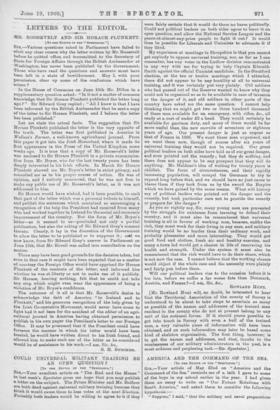LETTERS TO THE EDITOR.
MR. ROOSEVELT AND SIR HORACE PLUNKETT. ere THE EDITOR OF THE " SPROT1T011.1 SIR,--Various questions asked in Parliament have failed to -elicit any clear reason why the letter written by Mr. Roosevelt before he quitted office, and transmitted to the Secretary of
• State for Foreign Affairs through the British Ambassador at 'Washington, has never been published by the Government.
• Those who have read the questions and answers must have been left in a state of bewilderment. May •I, with your permission, clear up some of the • confusions which have arisen 'P In the House of Commons on June 10th Mr. Dillon in a Supplementary question asked: Is it not a mutter of common knowledge that Sir Horace Plunkett published the letter long ago p" Sir Edward Grey replied : " All I know is that I have been informed by the British Ambassador that he sent a copy of the letter to Sir Horace Plunkett, and I believe the letter Las been published."
Let me state the actual facts. The suggestion that Sir Rorace Plunkett published the letter is the very opposite of the truth. The letter was first published in America in Wallace's Farmer, a well-known agricultural journal. From this paper it got into the Irish Homestead, where it made its first appearance in the Press of the United Kingdom some weeks ago. It is true that a copy of Mr. Roosevelt's letter was enclosed to Sir Horace Plunkett in a private communica- tion from Mr. Bryce, who for the last twenty years has been deeply interested in his Irish efforts. In March Sir Horace Plunkett showed me Mr. Bryce's letter in strict privacy, and consulted me as to his proper course of action. He was of opinion, and I entirely concurred, that he was . not free to make any public use of Mr. Roosevelt's letter, as it was not addressed to him.
Sir Horace would have wished, had it been possible, to omit that part of the letter which was a personal tribute to himself, and publish the sentences which contained so encouraging a recognition of the help the President had received from many who had worked together in Ireland for the social and economic improvement of the country. But the form of Mr. Bryce's letter—so it seemed to us—precluded not only a partial publication, but also the asking of Sir Edward Grey's consent thereto, Clearly, it lay in the discretion of the Government to allow the letter to be published or to suppress it ; mid we now know, from Sir Edward Grey's answer in Parliament on June 15th, that Mr. Birrell was called into consultation on the matter.
There may have been good grounds for the decision taken, but even in that case it might have been expected that as a matter of courtesy the Foreign Office would have apprised Sir Horace Plunkett of the contents of the letter, and informed him whether be was at liberty or not to make use of it publicly. Sir Horace, hearing nothing, felt that he could not take any step which might even wear the appearance of being a 'violation of Mr. Bryce's confidence.
The outcome of it all is that Mr. Roosevelt's desire to acknowledge the debt of America "to Ireland and to Plunkett," and his generous recognition of the help given by the Irish Co-operative Movement, would never have come to light had it not been for the accident of the editor of an agri, cultural journal in America having obtained permission to publish in his own paper the President's letter to our Foreign Office. It may be presumed that if the President could have foreseen the manner in which his letter would have been treated, he would have written direct to his Irish friend, and allowed him to make such use of the letter as ho considered would be of assistance to his work.--I am, Sir, &c.,
S. H. BUTCHER.










































 Previous page
Previous page